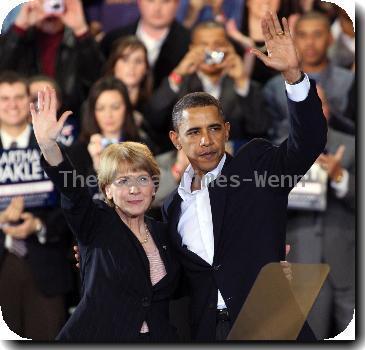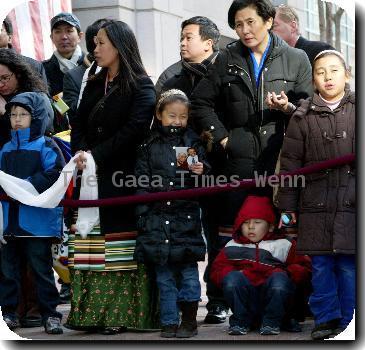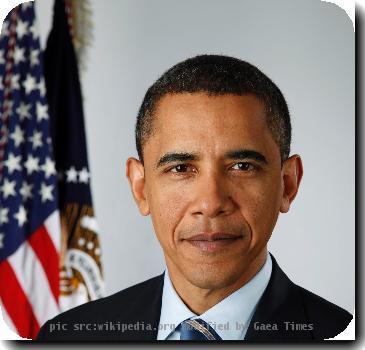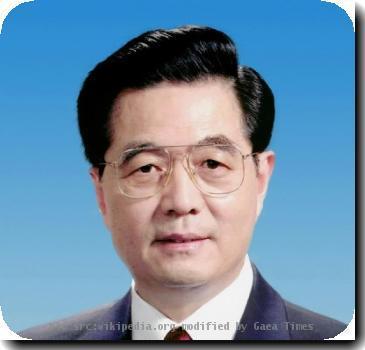Obama: Risks of nuclear attack have risen despite end of Cold War in history’s ‘cruel irony’
By Steven R. Hurst, APTuesday, April 13, 2010
Obama: Risks of nuclear attack have risen
WASHINGTON — President Barack Obama told assembled leaders at the 47-country Nuclear Security Summit Tuesday the risk of nuclear attack — not by an enemy nation, but from terrorists — was on the rise despite the end of the Cold War.
In his opening address to the first full day of the summit, Obama described the new nuclear reality as a “cruel irony of history.” He called the conference with the goal of locking down all nuclear materials worldwide in four years.
“The risk of a nuclear attack has gone up,” Obama said, as terrorist organizations like the al-Qaida network try to get their hands on nuclear materials.
By Monday night, when Obama hosted assembled presidents and prime ministers for a dinner, the summit had already paid early dividends: China’s agreement to work with the U.S. on possible sanctions against Iran and Ukraine’s decision to rid itself of nuclear bomb-making materials.
Obama had already held two days of meetings with selected leaders from among the 47 countries assembled to recharge efforts to keep nuclear material out of terrorist hands. It ends Tuesday with a joint declaration to guide future work toward locking away and cleansing the globe of materials still too easily accessible to terrorists.
Obama announced at the outset that South Korea will host the next conference of this kind in two years.
President Lee Myung-bak told reporters that North Korean leader Kim Jong Il will not get an invitation until the North gives up its nuclear weapons ambitions.
North Korea’s efforts to build a nuclear weapon program kept it out of the Washington summit.
China’s incremental move toward U.S. ambitions to sanction Iran and Ukraine’s plans get rid of highly enriched uranium put some wind in Obama’s sails as he presses global leaders to join him in securing all nuclear materials within four years.
Obama’s meeting with Chinese President Hu Jintao was the last of the summit warm-up sessions before the U.S. leader sat down with his guests at a working dinner.
After the Hu meeting, White House national security aide Jeff Bader said Iran was a major topic of discussion at the 90-minute session.
“They’re prepared to work with us,” Bader said, interpreting that willingness as “another sign of international unity on this issue.”
Obama has been pressing the case that a fourth round of sanctions is needed to persuade Iran to alter its perceived course toward a nuclear weapons capability.
China, while historically averse to tough sanctions and uneasy about potential damage to its trade relationship with Tehran, may indeed be coming on board with Obama. He already has the robust backing of Great Britain, France and Germany. Russia, too, has shown a willingness to join the sanctions effort, which would give Obama the required clean sweep of permanent members of the United Nations Security Council.
But when pressed on whether China had committed to anything specific on the sanctions front, Bader was less direct.
“We are going to be — we’ve started to work that and we’re going to be working on that in the coming days — coming days and weeks,” he said. Obama wants agreement on sanctions before summer.
In Beijing on Tuesday, Chinese Foreign Ministry spokeswoman Jiang Yu said: “China always believes that dialogue and negotiation are the best way out for the issue. Pressure and sanctions cannot fundamentally solve it.”
But she added that China supports a “dual-track strategy,” combining diplomacy with the possibility of international sanctions against Iran.
The Ukrainians, who gave a major boost to arms control in 1994 when they agreed to surrender the nuclear weapons they inherited in the collapse of the Soviet Union, agreed to get rid of their weapons-grade fuel by 2012.
Some details are yet to be worked out, including how and where the nuclear fuel will be disposed of, White House press secretary Robert Gibbs said.
The material could be sent to the U.S. or Russia, but Gibbs declined to specify the amount, other than to say it was enough to make several nuclear weapons.
When the summit began in earnest on Tuesday, the focus was Obama’s goal of ridding the world of nuclear weapons, with efforts to lock down materials to build those bombs an urgent first step.
Tons of plutonium and highly enriched uranium are believed to be insufficiently protected from international criminal gangs and terrorist organizations.
A report Monday by a Harvard nonproliferation found that Pakistan’s nuclear stockpile was the world’s least secure from theft or attack.
Pakistani Prime Minister Yusuf Raza Gilani, in Washington for the conference, insisted that his country’s nuclear weapons are well-guarded.
Tags: Asia, Barack Obama, China, District Of Columbia, East Asia, Eastern Europe, Europe, Foreign Policy, Greater China, Hu Jintao, Iran, Lee Myung-bak, Middle East, North America, North Korea, Nuclear Weapons, Summits, Terrorism, Ukraine, United States, Washington, Weapons Of Mass Destruction











